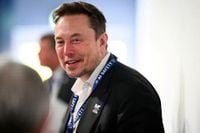Elon Musk’s social media platform, X (formerly Twitter), has raised nearly $1 billion in new equity funding from investors. These funds allow the company to be valued at approximately $32 billion, which aligns with Musk's acquisition price in 2022. As reported by Bloomberg, the deal framework mirrors the complex financial structure when Musk purchased the platform, which included over $12.5 billion in debt.
Musk himself was a participant in this funding round, alongside notable investors like Darsana Capital Partners and 1789 Capital. The latter has been involved in backing multiple ventures led by Musk, including projects such as xAI and SpaceX. Musk’s approach of turning towards private markets is evident, as evidenced by SpaceX recently completing a tender offer that pushed its valuation to around $350 billion and xAI reportedly pursuing new funding rounds at a valuation of roughly $75 billion.
Despite Musk's private ventures flourishing, the public side of his empire, Tesla Inc, has seen significant stock declines. This year alone, Tesla’s shares have plummeted by over 40%. One factor attributed to this downturn is Musk's increased visibility in political arenas, which has caused some consumers to question their loyalty, coupled with heightened competition from other electric vehicle manufacturers. Just a couple of days earlier, on March 18, Tesla’s shares saw a 5.3% drop triggered by news of a rival automaker, BYD Co, unveiling an EV that can charge almost as quickly as traditional gasoline cars.
The story of X has been tumultuous ever since Musk took over in 2022, with harsh workforce reductions and a massive pullback in advertising spending that have occurred. Many marketers withdrew their spending fearing their ads would be displayed next to objectionable content, prompting Musk to initiate legal action against companies that participated in these boycotts. Currently, X is pursuing several brands under the claim that their withdrawal represents anti-competitive behavior.
While some advertisers have slowly started to return since the political landscape changed with Trump’s re-election, X’s financial health remains under scrutiny. According to Fidelity Investments, an investor in X, the company was marked down by 68% earlier this year, indicating a substantial loss following Musk's takeover.
The next phase for Musk involves efforts to stabilize X's financial framework and work toward funding over $1 billion in junior debt. Reports from the Financial Times indicate that Musk plans to raise about $2 billion through selling equity, which is strategically intended to offset this looming financial obligation. Since acquiring the platform, Musk has faced backlash, seen users flee the site, and advertisers exit. His actions, including terminating around 75% of X’s workforce and eliminating many moderation rules, have significantly affected user numbers and advertiser confidence.
Interestingly, despite the significant value loss initially assessed at 80%, investors are now highlighting a rebound back to the original $44 billion valuation established at the time of Musk's takeover. This change in perspective comes with some encouraging financial news—sources say that X recently posted adjusted earnings around $1.2 billion for 2024, essentially reinstating its financial performance to pre-Musk levels, although sources indicate these figures may have been “wildly adjusted.”
The renewed interest from investors—which has brought some to believe X's value could genuinely be on the rise—could also correlate with large Wall Street banks now largely divesting in the $12.5 billion loans Musk accrued when he bought the platform. This surge of interest from lenders seemed to coincide with Trump’s electoral victory earlier this year and Musk's prominent political role as one of his chief advisors. This new investor confidence might also stem from Musk’s allocation of a 25% stake in his artificial intelligence company, xAI, to investors in X, which is now valued at about $45 billion.
Nevertheless, when we consider Musk's broader corporate landscape, not everything is rosy. While investments in X may flourish, Musk is facing a downturn in the Tesla sector, where stock prices have dramatically declined due to increasing operational pressures and market changes. The market slump is believed to be related to Musk’s shifting political rhetoric and the resulting consumer sentiment that it has generated. The stark contrast of fortunes can be observed, for instance, when Trump took to a promotional platform for Teslas, despite previously denouncing electric vehicles. In a twist, the former president stood in front of cameras next to Musk, committing to buy a Tesla while simultaneously discussing 'domestic terrorism' charges for anyone damaging one.
As Musk balances these multiple threads of his empire, the financial resilience of X may depend on how marketing trust can be restored amid a backdrop of recent controversy. His focus now is pivoting towards solidifying investor confidence and reviving advertiser engagement aimed at producing sustainable revenue while pushing forward with ambitious platforms and technological expansions.


